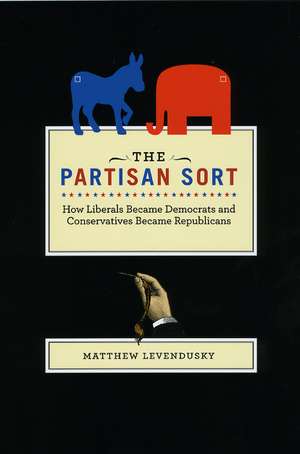The Partisan Sort: How Liberals Became Democrats and Conservatives Became Republicans: Chicago Studies in American Politics
Autor Matthew Levenduskyen Limba Engleză Paperback – 3 dec 2009
As Washington elites drifted toward ideological poles over the past few decades, did ordinary Americans follow their lead? In The Partisan Sort, Matthew Levendusky reveals that we have responded to this trend—but not, for the most part, by becoming more extreme ourselves. While polarization has filtered down to a small minority of voters, it also has had the more significant effect of reconfiguring the way we sort ourselves into political parties.
In a marked realignment since the 1970s—when partisan affiliation did not depend on ideology and both major parties had strong liberal and conservative factions—liberals today overwhelmingly identify with Democrats, as conservatives do with Republicans. This “sorting,” Levendusky contends, results directly from the increasingly polarized terms in which political leaders define their parties. Exploring its far-reaching implications for the American political landscape, he demonstrates that sorting makes voters more loyally partisan, allowing campaigns to focus more attention on mobilizing committed supporters. Ultimately, Levendusky concludes, this new link between party and ideology represents a sea change in American politics.
In a marked realignment since the 1970s—when partisan affiliation did not depend on ideology and both major parties had strong liberal and conservative factions—liberals today overwhelmingly identify with Democrats, as conservatives do with Republicans. This “sorting,” Levendusky contends, results directly from the increasingly polarized terms in which political leaders define their parties. Exploring its far-reaching implications for the American political landscape, he demonstrates that sorting makes voters more loyally partisan, allowing campaigns to focus more attention on mobilizing committed supporters. Ultimately, Levendusky concludes, this new link between party and ideology represents a sea change in American politics.
Din seria Chicago Studies in American Politics
-
 Preț: 184.18 lei
Preț: 184.18 lei -
 Preț: 200.26 lei
Preț: 200.26 lei -
 Preț: 200.74 lei
Preț: 200.74 lei -
 Preț: 184.22 lei
Preț: 184.22 lei -
 Preț: 139.51 lei
Preț: 139.51 lei -
 Preț: 199.68 lei
Preț: 199.68 lei -
 Preț: 181.43 lei
Preț: 181.43 lei -
 Preț: 184.18 lei
Preț: 184.18 lei -
 Preț: 200.74 lei
Preț: 200.74 lei -
 Preț: 238.41 lei
Preț: 238.41 lei -
 Preț: 214.41 lei
Preț: 214.41 lei -
 Preț: 238.12 lei
Preț: 238.12 lei -
 Preț: 200.15 lei
Preț: 200.15 lei -
 Preț: 184.88 lei
Preț: 184.88 lei -
 Preț: 186.99 lei
Preț: 186.99 lei -
 Preț: 187.09 lei
Preț: 187.09 lei -
 Preț: 185.51 lei
Preț: 185.51 lei -
 Preț: 154.99 lei
Preț: 154.99 lei -
 Preț: 184.45 lei
Preț: 184.45 lei -
 Preț: 222.81 lei
Preț: 222.81 lei -
 Preț: 264.38 lei
Preț: 264.38 lei -
 Preț: 234.24 lei
Preț: 234.24 lei -
 Preț: 244.76 lei
Preț: 244.76 lei -
 Preț: 219.11 lei
Preț: 219.11 lei -
 Preț: 244.51 lei
Preț: 244.51 lei -
 Preț: 262.29 lei
Preț: 262.29 lei - 23%
 Preț: 676.12 lei
Preț: 676.12 lei -
 Preț: 142.44 lei
Preț: 142.44 lei - 23%
 Preț: 569.99 lei
Preț: 569.99 lei - 23%
 Preț: 579.86 lei
Preț: 579.86 lei - 23%
 Preț: 580.45 lei
Preț: 580.45 lei -
 Preț: 248.79 lei
Preț: 248.79 lei -
 Preț: 493.87 lei
Preț: 493.87 lei -
 Preț: 266.29 lei
Preț: 266.29 lei -
 Preț: 137.72 lei
Preț: 137.72 lei -
 Preț: 230.71 lei
Preț: 230.71 lei -
 Preț: 263.71 lei
Preț: 263.71 lei -
 Preț: 258.74 lei
Preț: 258.74 lei -
 Preț: 257.00 lei
Preț: 257.00 lei -
 Preț: 265.55 lei
Preț: 265.55 lei -
 Preț: 233.98 lei
Preț: 233.98 lei
Preț: 228.85 lei
Nou
Puncte Express: 343
Preț estimativ în valută:
43.80€ • 45.24$ • 36.45£
43.80€ • 45.24$ • 36.45£
Carte tipărită la comandă
Livrare economică 25 martie-08 aprilie
Preluare comenzi: 021 569.72.76
Specificații
ISBN-13: 9780226473659
ISBN-10: 0226473651
Pagini: 200
Ilustrații: 11 line drawings,11 tables
Dimensiuni: 152 x 229 x 20 mm
Greutate: 0.27 kg
Editura: University of Chicago Press
Colecția University of Chicago Press
Seria Chicago Studies in American Politics
ISBN-10: 0226473651
Pagini: 200
Ilustrații: 11 line drawings,11 tables
Dimensiuni: 152 x 229 x 20 mm
Greutate: 0.27 kg
Editura: University of Chicago Press
Colecția University of Chicago Press
Seria Chicago Studies in American Politics
Notă biografică
Matthew Levendusky is assistant professor of political science at the University of Pennsylvania.
Cuprins
List of figures
List of tables
Acknowledgements
CHAPTER 1. The Transformation of the American Electorate
CHAPTER 2. Why Voters Sort
CHAPTER 3. Have Voters Sorted?
CHAPTER 4. Testing Competing Explanations for Sorting
CHAPTER 6. How Voters Sort
CHAPTER 7. The Impact of the Sorted
Appendix Data Used
Notes
Bibliography
Index
List of tables
Acknowledgements
CHAPTER 1. The Transformation of the American Electorate
CHAPTER 2. Why Voters Sort
CHAPTER 3. Have Voters Sorted?
CHAPTER 4. Testing Competing Explanations for Sorting
CHAPTER 6. How Voters Sort
CHAPTER 7. The Impact of the Sorted
Appendix Data Used
Notes
Bibliography
Index






